L3: Hypothalamic-Pituitary Adrenal Axis
1/67
There's no tags or description
Looks like no tags are added yet.
Name | Mastery | Learn | Test | Matching | Spaced | Call with Kai |
|---|
No analytics yet
Send a link to your students to track their progress
68 Terms
Two functional divisions of the adrenal glands
Inner medulla
Outer cortex
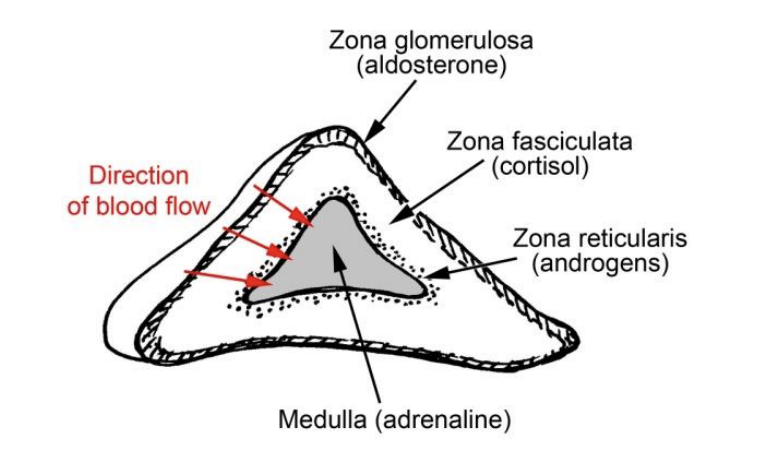
Medulla: origin
neural crest origin
Medulla: upon stimulation by sympathetic preganglionic fibres…
Chromaffin (chromium stain affinity) cells
release catecholamine hormones in circulation
e.g Adrenaline
What is adrenaline made from
noradrenaline by the enzyme PNMT
pehtylethanolamine N-methyltransferase)
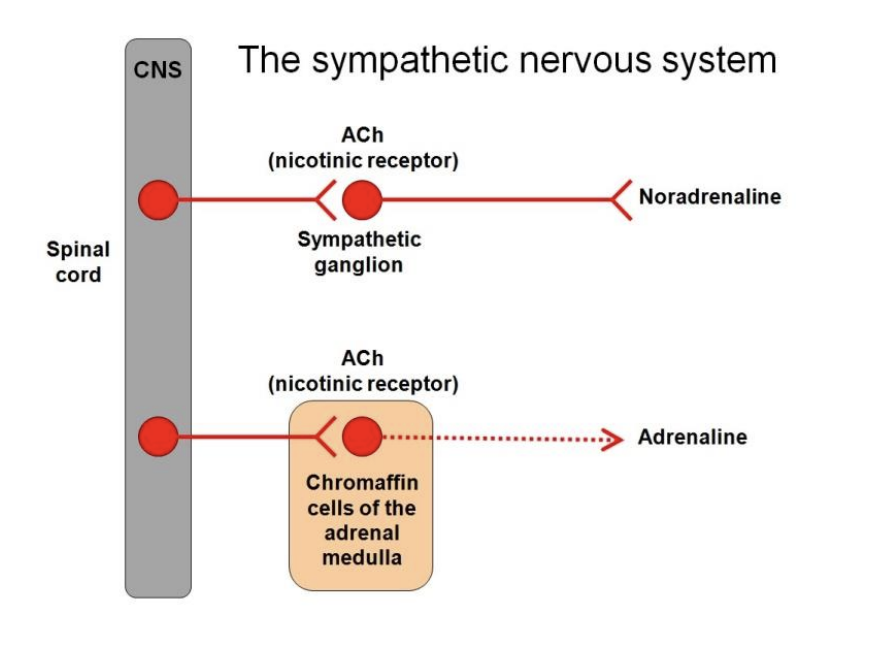
Does the medulla also secrete noradrenaline?
A SMALL amount
but too low to be significant in the blood
→ mainly works as a neurotransmitter
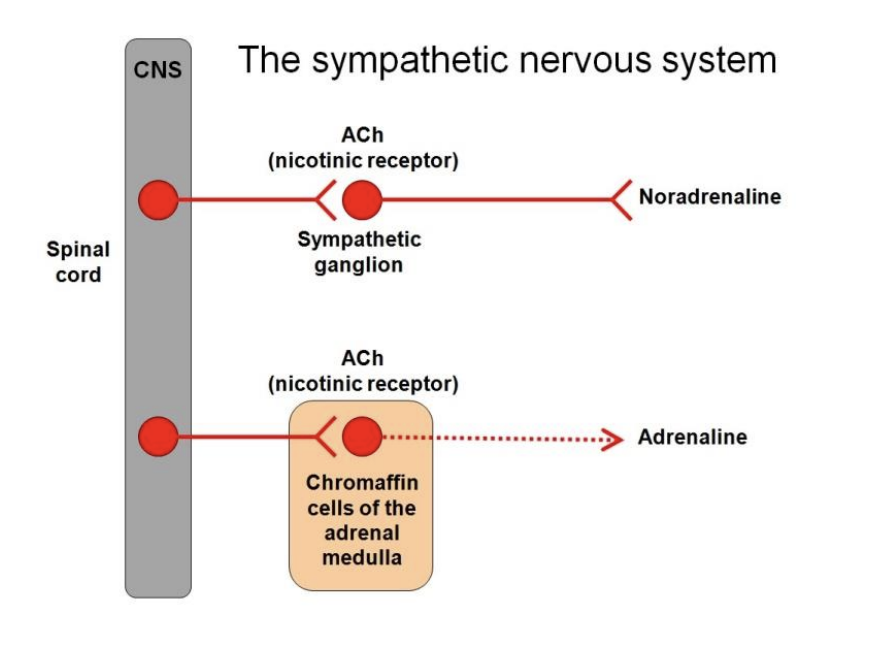
Cortex: strucutre in the adrenal gland and origin
makes up 85% of the adult adrenal gland
derived from embryonic mesoderm
What does the adrenal cortex secrete
wide range of steroid hormones
synthesised from cholesterol
What does it secrete in the human fetus?
LARGE fetal zone of the inner cortex
synthesizes the androgen DHEA
What happens to the fetal zone after birth?
degenerates and disappears after birth
outer cortex expands to form three zones in the adult gland
Three zones of the adult adrenal gland
Zona glomerulosa
Zona reticularis
Zona Fasciculata
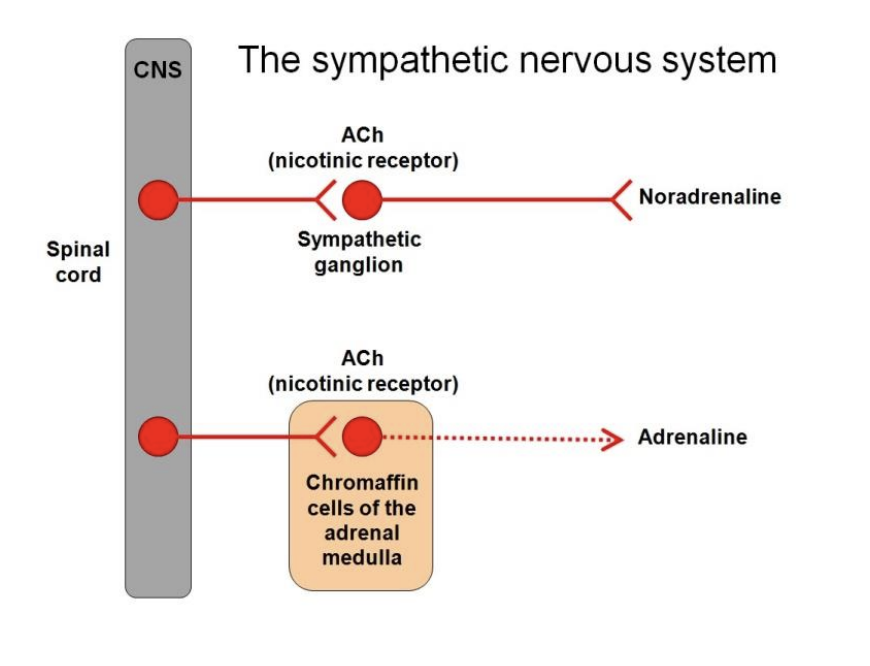
zone glomerulosa
outermost zone
What does it secrete
hormone aldosterone
→ mineralcorticoid
effects plasma electrolytes
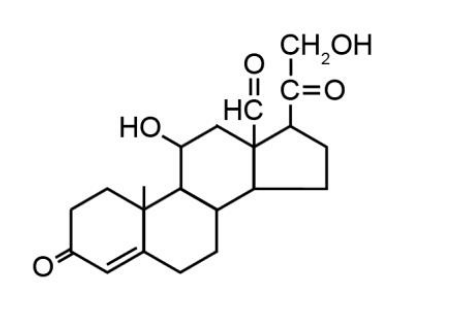
Where does aldosterone act
on distal tubule of the kidney
AND: on sweat glands and salivary glands and gut
What does aldoesterone do
Promotes:
reabsorption of Na+
secretion of K+
proton section by type-A intercalated cells of the kidney
Important factors increasing aldoestone secretion
increased plasma potassium ion concentration
angiotensin II
Role of ACTH?
DOES NOT influence secretion rate of aldosterone
but
ACTH is needed as permissive factor
allows secretion to occur
What does loss of ACTH or destruction of adrenal glands cause?
→ mineralcorticoid deficiency
Zona reticularis
innermost zone
What does it secrete
weak androgens
importantly→ DHEA (dehydroepiandrosterone)
effect on men vs women?
Men→ no significant effect
coz the testes secrete large amounts of ‘strong’ androgen testosterone
Women→ around half of circulating androgens are from adrenal gland
Also→ promote sexual behaviour in female primates and libido in women
What are these androgens converted into?
converted peripherally to the moore potenent testosterone and 5alpha-DHT
→ responsible for pubic and axillary hair
Weak anddrogens may alternatively be converted to…
Oestrogens
WHERE?: Both within the cortec and elsewhere in the body
→ becomes an important source after the menopause
Zona fasciculata
the middle and largest zone of the adrenal cortex
What is it secrete/make?
makes steroid hormones→ glucocorticoids
→ thse increase glucose levels
Important glucocorticoids
Cortisol→ most important
Corticosterone→ secreted in place of cortisol in some other animals including rates
What are corticosteroids
Collective term for:
Mineral corticoids
and
Glucocorticoids
Control of the adrenal cortex: what is pro-opiomelanocortin (POMC)
protein precursor
from which a number of polypeptide hormones are cleaved
WHERE: within corticotrophs of the anterior pituitary
Products of POMC include
beta-endorphin
melanocyte-stimulating hormone (MSH)
→ associated with colour changes in vertebrates
What is the most important POMC derivative
Adrenocorticotrophic hormone (ACTH)
39 amino acid polypeptide
What is the Hypothalamic-pituitary adrenal axis (HPA)
hierarchical control structure
within which ACTH plays a role
HPA axis:
releases corticotropin-releasing hormone (CRH)
stimulates corticotrophs
(forms 20% of the anterior pituitary)
release ACTH
(ADH may augment ACTH release in times of stress)

ACTH effect
General stimulatory effect on adrenal cortex
increases the size of cortical cells
needed for normal adrenal cortical function
simulates synthesis and secretion of cortisol
Negative feedback effect by cortisol on the HPA axis, demonstrated by…
Demonstrated by adrenal gland ablation on one side:
Slow enlargement of contralateral adrenal cortex
repeated injections of exogenous cortisol
→ cause atrophy of adrenal cortex
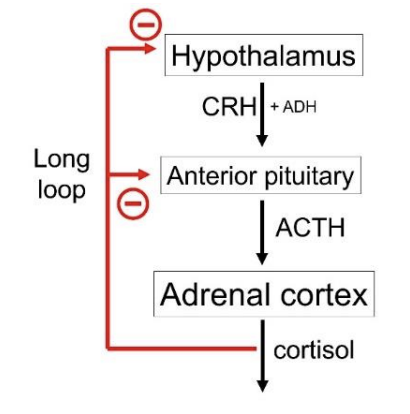
Cortisol: how is it released
in pulses
following the pulsatile release of ACTH
Cortisol pronounced circadian rhythm
large surge in the hours just before wakng in the morning
Cortisol: how is it transported?
95% of plasma cortisol is bound to protein→ cortisol binding globulin
(CBG= transcortin)
Cortisol half-life
LONG half-life
70 mins
How does cortisol work
As a typical steroid hormone:
binds to cytoplasmic receptor
moves to the nucleus and regulates gene expression
Therefore, the timing of effect…
may take hours→ days
What is stress?
an adverse circumstance that disturbs, or is likely to disturb, the normal physiological or psychological functioning of an individual
What is pschological stress
anticipation, justified or not, that a challenge to homeostasis looms
What situations are stressful?
unpredictable situations
and those out of our control
Stressors are met by responses:
Physiological→ met by specific endocrine response
e.g PTH in response to hypocalcaemia
Other stressors→ induce ‘general adaptation syndrome’
What is the General Adaptation Syndrome
Alarm reaction
stage of resistance
stage of exhaustion (inappropriately named)
Alarm reaction
Involves:
sympathetic nervous response → instant
Hypothalamic-pituitary adrenal axis→ glucocorticoids released after a few mins
Stage of resistance
new dynamic state
whereby homeostais is restored
although perhaps with different set points
lasts days or weeks
Stage of exhaustion
detrimental effects of chronic stress
Selye thought→ the body was running out of stress hormones
BUT: we now know that it is chronically elevnated levels of
glucocorticoids
→ responsible for many of these effects
Selye’s concept used today?
still useful
specific phyiologcical responses can be seen as superimposed onto this specific general response
Important note about what stress is referring to
Can also be
strenuous exercise
sex
animal courtship
→ also increase cortisol release
THERFORE: must be cautious in interpreting any iinstance of elevated cortisol as being unpleasant ‘stressful’ situation, without additional evidence
Cortisol glucocorticoid role: when is cortisol released
in response to hypoglycerimia
helps to raise blood sugar levels
→ glucocorticoid role
Long -term or short term effects?
more important in the long-term
Specific role of cortisol
promotes breakdown of muscle and plasma proteins to provide amino acids for gluconeogenesis
stimulates liver enzymes to convert amino acids to glucose
inhibits glucose uptake by muscle adipose tissue to preserve it for tissues such as brain
An insulin resistance effect similar to that of GH~
Promotes FFA release from adipose tissue
indirectly and
As a permissive factor→ allow GH and adrenaline to have this effect
What does the nocturnal surge of cortisol do?
help protect liver glycogen stores
so remain available for emergencies
What happens to humans with deficiency of both GH and ACTH during strenous exercise or starvation?
precipitate fatal hypoglycaemia
see chicken experiment
Cortisol importance
it is essential for life
What is acute inflammation
local reaction to injury involving:
increased local blood flow
increased capillary permeability
exudation of white blood cells
How are these responses mediated?
chemical mediators
released from damaged cells
What does cortisol do?
inhibits many components of the inflammatory process
The HPA axis and immune system
interact closely with the immune system
High levels of glucocorticoids results in…
Immunosuppression
and stress can exacerbate certain diseases
How is this adaptive?
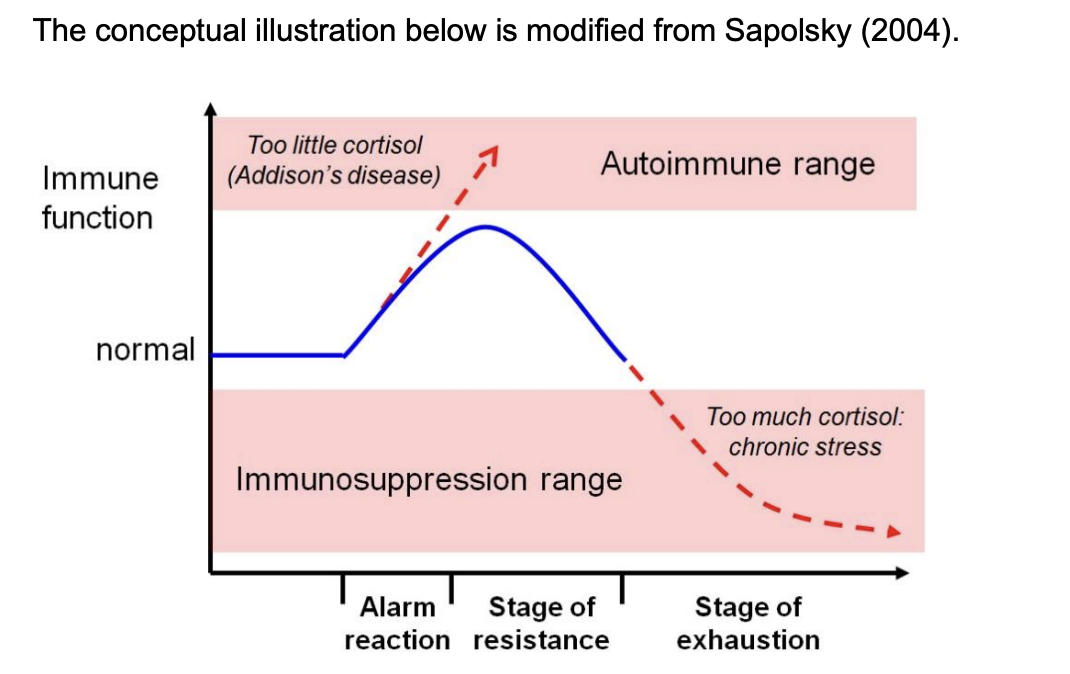
How is it adaptive?
Under normal circumstances→ immune system becomes activated at the onset of stressful challenege
Cortisol’s role may be to restrain this elevated immune response
returning things to normal later on
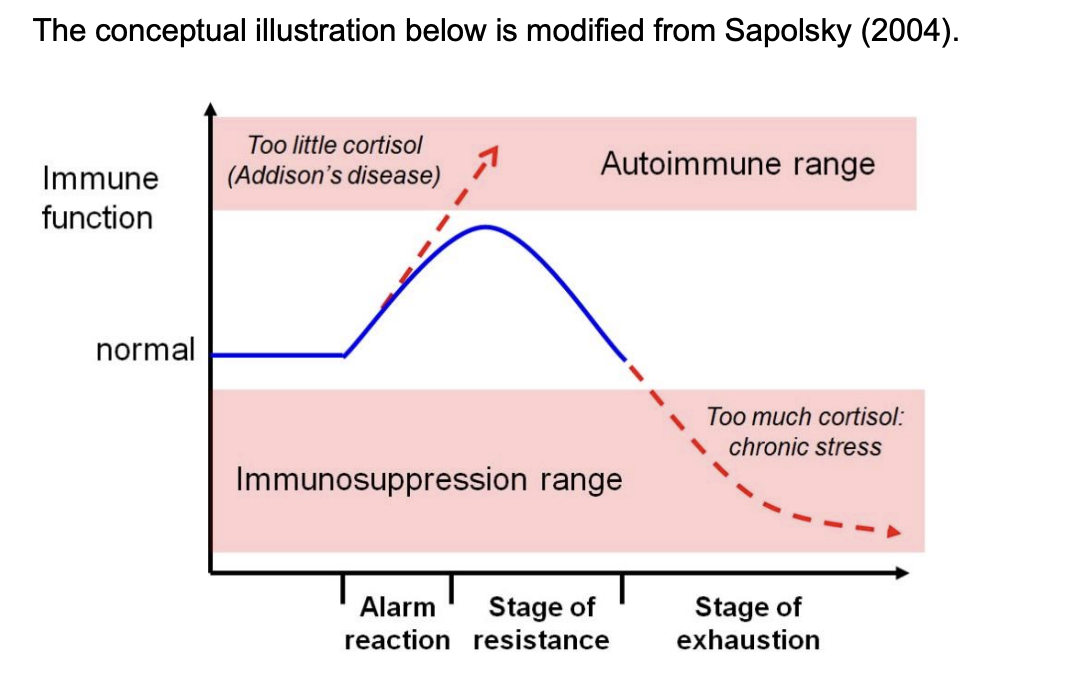
Compared to pharmacological doses of glucocorticoids (or chronic stress)
Different
immune response is suppressed to levels below the baseline

Other actions of cortisol: where does cortisol act
surprising number of tissues
some are seen as permissive or have generalized functions
Examples of other effects of cortisol
Secreted by fetal adrenal gland in late gestation
number of roles in fetal maturation and preparations for birth
Allows arteriolar smooth muscle to respond to noradrenaline, adrenaline and angiotensin II
vital in maintaining BP (another reason why cortisol is essential)
Change your mood
sensory acuity
jet-lag due to circadian rhythm of cortisol being out of step
Inihibits bone formation and collagen synthesis in the skin
suppress reproductive function
Some mineral corticoid activity
How does cortisol have some mineral corticoid activity?
receptor of aldosterone has some affinity for cortisol
But because cortisol is secreted in much larger quantities than aldosterone
Need to prevent the aldosterone receptor in the kidney from being overwhelmed by cortisol:
distal tubule cells express enzyme→ degrades cortisol
enzyme is inhibited by glycyrrhetinic acid
What happens if you have too much glycrrhetinic acid?
you reabsoard too much Na+
→ Hypertension
Essay questions
Why do we have adrenal glands? (NST 1B 1993)
Compare and contrast the metabolic roles of growth hormone and cortisol.
Discuss the role of cortisol in times of stress.